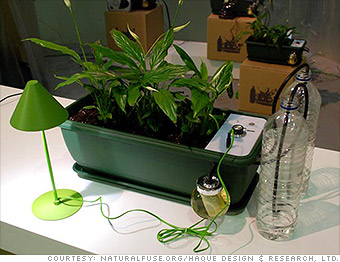

Cows. Crops. Sewers. Thanks to the 'Internet of Things' trend, the world is now full of crazy, wirelessly connected stuff. Here are some of the wildest.

Why let your bonsai ficus waste away on the windowsill when you can use it to help reduce your city's carbon footprint?
Natural Fuse monitors the carbon-absorbing capabilities of plants and uses it to "offset" the carbon generated by everyday activities like turning on a light. The plants are networked together over the Internet, and information is collected on an online power grid of sorts.
Each plant unit includes a power socket for an appliance like a desk lamp. If you turn your appliance on and the plant can't offset the carbon use on its own, other plants in the network will activate to cover the difference.
The system -- a technical proof-of-concept mixed with an art project -- is designed to grimly illustrate the costs of profligate energy use: If the network's carbon footprint slides into negative territory, it kills a random plant by tipping over a jar of vinegar that's attached to the unit.
The grid is powered by Cosm, a data platform that's another project from Natural Fuse founder Usman Haque. There's a sociological element to Natural Fuse, Haque says, because users are encouraged to work together to keep the system in balance.
A few dozen Natural Fuse units are deployed in cities all over the world, from the U.S. to the U.K., Australia and South Korea.